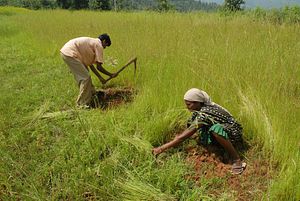With just 13 years to achieve the planet’s most ambitious development goals in history, there is no engine better suited to drive this global transformation than the Asia-Pacific. A region with a heavy influence on global policy, it is home to leading centers for innovation, finance, and health, as well as celebrated and diverse food cultures. The Asia-Pacific has led the world in economic growth – and from “tiger economies” to “tiger food systems” – this region now has the potential to also lead the world in ensuring healthy, sustainable food for all.
Last month, the United Nations reported that after steady declines for more than a decade, world hunger was again on the rise. This served as a stark reminder that today’s global food system is failing both people and planet. While 815 million people – more than one in 10 worldwide – suffer from undernutrition, one-third of all food produced goes to waste. And in parallel, levels of overweight and obesity continue to increase, now affecting more than 2 billion children and adults. Unhealthy diets have become a leading risk factor for disease globally and the main driver of the epidemic of chronic conditions such as diabetes and heart disease, putting an enormous and rapidly growing burden on healthcare systems.
How we grow, process, transport, consume, and waste food is also driving our global environmental crises. The agricultural sector is the single biggest emitter of greenhouse gases and a major contributor to deforestation, species extinction, and the depletion of both marine systems and fresh water resources. As hunger rises – powered significantly by climate change – greater pressure mounts on an already overstretched, inefficient, and unsustainable food system, further accelerating climate change and ecological decline.
Whether here in the Asia-Pacific or across our planet, it’s the interlinkages between these great threats that define their urgent potency, but also provide us our greatest opportunities for action. Just as the challenges are intimately intertwined, our actions must be integrated across sectors, disciplines and continents. A core premise of the Sustainable Development Goals (SDGs) is that we will never achieve the future we want by repeating past mistakes, nor by working in silos. To end malnutrition in all its forms, we must holistically address all food-related challenges. The world must learn from strides made in this region to overcome undernutrition, particularly among children, while simultaneously sharing success stories to curb rapidly rising rates of regional obesity. We must make food our powerful link between planetary and human health.
This is why the EAT Foundation, a global science-lead multi-stakeholder platform linking food, health, and sustainability, and the Ministry of Health of the Republic of Indonesia have joined forces to organize the first EAT Asia-Pacific Food Forum on October 30-31 in Jakarta. Inspired by the annual EAT Stockholm Food Forum — now in its fourth year — this forum aims to catalyze collaborative and concerted action, share cutting-edge knowledge and best practices, and co-design local, regional, and global solutions to address the planet’s broken food system.
This forum aims to amplify the voices of great scientists who are protecting the health of our children, and rescuing our ecological and agricultural biodiversity; the disruptive chefs who are rethinking plant-forward diets and rewriting global menus; the tech innovators who are behind healthy, tasty and sustainable food breakthroughs; the politicians achieving integrated policies that put healthy food from sustainable food systems on their nations’ dinner plates; and the civil society leaders who are inspiring food movements everywhere, and holding us all accountable for our words and actions.
Promising initiatives are already springing up across this dynamic and fast-adapting region — from urban agriculture projects flourishing in Beijing and Tokyo, to Indonesia’s New Generation of Tasty Kitchens and Singapore’s recent industry pledge to cut workplace sugary drinks by 2020. But while we must celebrate the progress being made, we must also acknowledge that further collaboration, coordination, and alignment of efforts is an imperative to scale up the actions required to achieve our 2030 vision.
As the most populous region in the world and home to global hubs for business, science, biodiversity and innovation, the Asia-Pacific is in a position to play a decisive role in leading this movement. If our crop is sustainable and healthy food for all, then this region is the world’s ideal fertile field. We only have 13 years to achieve the SDGs. Our hope is that the leading minds in science, politics, business, and civil society converging on Jakarta for 48 hours can help us make great strides towards this urgent food transformation.
Food cannot remain one of our greatest global threats. It should become our key for breakthrough solutions. By working as one, this defining region can help provide the recipe to achieve a deliciously healthy future for our entire planet.
Professor Nila F. Moeloek is Minister of Health of the Republic of Indonesia. Dr. Gunhild A. Stordalen, is Founder and President of the EAT Foundation.

































